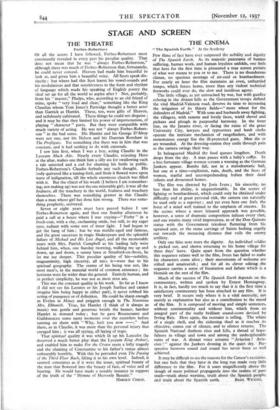STAGE AND SCREEN
THE THEATRE
Forbes-Robertson
OF all the actors I have followed, Forbes-Robertson most consistently revealed in every part his peculiar quality. That does not mean that he was " always Forbes-Robertion," although there was much of Forbes-Robertson that, fortunately, he could never conceal. Heaven had made him beautiful to look at, and given him a beautiful voice. All Scots speak dis- tinctly ; but where had this Scot learnt his vowel-sounds and
his modulations and that sensitiveness to the form and rhythm of language which made his speaking of English poetry the ideal set up for all the world to aspire after ? Not, probably, from his " master," Phelps, who, according to an old friend of mine, spoke " very loud and clear," something like the King
Claudius whom Tom Jones's Partridge thought a better actor than Garrick as Hamlet. These, too, were gifts of Heaven, and sedulously cultivated. These things he could not disguise ; and it may be that they limited his power of impersonation, of playing " character " parts. But they were compatible with much variety of acting. He was not " always Forbes-Robert- son " in the bad sense. His Hamlet and his George D'Alroy were not one, nor his Nelson and his Dunstan Renshaw in The Profligate. Yet something else there was in him that was constant, and it had nothing to do with externals.
I saw him first, when I was a boy, acting Claudio in the Lyceum Much Ado. Nearly every Claudio, rejecting Hero at the altar, makes one think him a silly ass for swallowing such a tale untested and a cad for shaming his bride in public. Forbes-Robertson's Claudio forbade any such thought. His body quivered like a tuning-fork, and from it flowed wave upon wave of indignation, till the whole enormous church was filled with it. But the object of his wrath (I believe I am remember- ing, not making up) was not the one miserable girl; it was all the foulness, all the treachery in the world, foulness and treachery themselves. There was something greater in this Claudio than a man whose girl has done him wrong. There was some- thing prophetic, universal.
Seven or eight years must have passed before I saw Forbes-Robertson again, and then one Sunday afternoon he paid a call at a house where I was staying—" Forby " in a frock-coat, with a shy, enchanting smile, but still, to my eager eyes, radiant with some sort of inner light. I had begun to get the hang of him ; but he was middle-aged and famous, and the great successes in tragic Shakespeare and the splendid failure of Michael and His Lost Angel, and all the memorable years with Mrs. Patrick Campbell as his leading lady were behind him, when, one Sunday morning, walking me up and down, up and down, a sunny lawn at Stratford-on-Avon, he let me see deeper. This peculiar quality of his—nobility, magnanimity, high sincerity, all miss it—were due to his spiritual geography. The centre of his being was not, like most men's, in the material world of common existence ; his horizons were far wider than the general. Entirely human, and in perfect simplicity, he was not as most men are.
This was the constant quality in his work. So far as I know (I did not see his Leontes or his Joseph Surface and cannot imagine him being happy in either part), it never robbed his acting of pungency or of definition. He could be sharp enough as Evelyn in Money and priggish enough in The Notorious Mrs. Ebbsmith. True, his Hamlet (I think of it always as music) was gentle and generous beside the keener, harsher Hamlet in demand today ; but he gave Rosencrantz and Gifildenstern some nasty moments over the recorders before turning on them with " Why, look you now —." And there, as in Claudio, it was more than the personal injury that enraged him ; it was all spying, all laying of traps.
That spiritual quality it was which lit up his Lancelot (he deserved a much better play than the Lyceum King Arthur), and enabled him to make For the Crown seem a lofty tragedy and the chaining of Constantine to his father's statue almost unbearably horrible. With this he pervaded even The Passing of the Third Floor Back, lifting it to his own level. Indeed, it seemed sometimes as if it were the inner, spiritual beauty of the man that flowered into the beauty of face, of voice and of bearing. He would have made a notable instance in support of the truth of the " Hymne of Heavenly Beautie."
HAROLD CHILD.














































 Previous page
Previous page